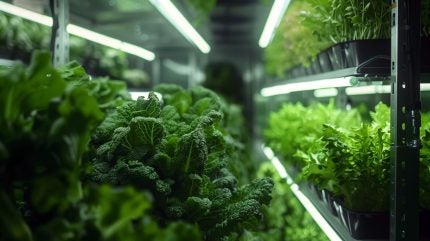
Italy’s Planet Farms plans to invest over £25m ($33.2m) in a new vertical farming facility in the UK.
The controlled indoor environment agri-tech business, headquartered in Milan, said in a statement the construction of the 20,000 square-meter facility will begin later this year with initial production targeted for early 2027.

Discover B2B Marketing That Performs
Combine business intelligence and editorial excellence to reach engaged professionals across 36 leading media platforms.
Planet Farms, set up in 2018 by Luca Travaglini and Daniele Benatoff, said the farm will “replicate” the company’s site in Cirimido, Italy.
That site supplies Italian and Swiss retailers, including Carrefour, Esselunga, Aspiag and Iper with leafy greens.
Planet Farms also said it began supplying Waitrose stores in the UK on 30 April and plans to announce another retail partnership soon.
The UK investment follows the launch of a joint venture between Planet Farms and Swiss Life Asset Managers, part of the Swiss Life Group.

US Tariffs are shifting - will you react or anticipate?
Don’t let policy changes catch you off guard. Stay proactive with real-time data and expert analysis.
By GlobalDataPlanet Farms said the venture is backed by up to €200m ($227.5m) in capital from the two firms and supported by additional debt financing.
Swiss Life Asset Managers is allocating up to €125m to support the development and construction of upcoming indoor farming facilities targeted for Europe, the Middle East and Africa.
Another vertical farming project is already in progress in Scandinavia.
Travaglini, who as well as the company’s co-founder is chairman and CTO said: “Reliable supply chains are mission critical to our customers and this partnership allows us to deploy the infrastructure to structurally address topical issues, including climatic volatility, a shifting global trade landscape, and sustainability.”
Planet Farms will provide the engineering, software, robotics and agronomic expertise for the development and operation of the fully automated sites.
Vertical farming is a capital-intensive business despite the environmental positives of using less water than typical agriculture, usually without the need for soil and pesticides. Then there is the freshness aspect of having farms located near supply chain networks.
However, many vertical farms employ artificial lighting such as LEDs to grow crops 24-7 and through the varying seasons, which is one factor behind businesses typically needing a flow of external investment funds to support growth.
Many have gone out of business despite the surge in popularity over the past couple of years or so, especially as investment funds dried up with the increase in borrowing costs to tackle inflation.
One such company is US-based Plenty Unlimited, which filed for Chapter 11 bankruptcy in March but at the same time said it had also received a “commitment” for debtor-in-possession (DIP) financing of $20.7m. It was set up in 2014.
And in April, UK-based vertical farmer Jones Food Company, founded in 2017, went into administration.





